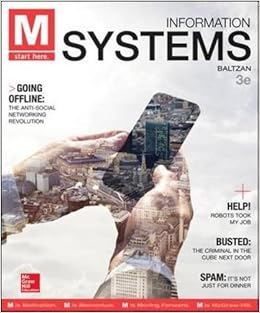
Free Downloads M: Information Systems

•Batlzan; M: Information Systems is a visual, magazine format designed to engage your students from the start! Saturated with fascinating, sometimes hard-to-believe real examples will keep them reading throughout the course. Baltzan’s approach discusses various business initiatives first and how technology supports those initiatives second. The premise for this unique approach is that business initiatives drive technology choices in a corporation. Therefore, every discussion addresses the business needs first and addresses the technology that supports those needs second. This approach takes the difficult and often intangible MIS concepts, brings them down to the student’s level, and applies them using a hands-on approach to reinforce the concepts. A derivative of the Baltzan; Business Driven Technology version, this M: Information Systems provides the foundation that will enable students to achieve excellence in business, whether they major in operations management, manufacturing, sales, marketing, etc. M: Information Systems is designed to give students the ability to understand how information technology can be a point of strength in an organization.

Paperback: 272 pages
Publisher: McGraw-Hill Education; 3 edition (January 10, 2014)
Language: English
ISBN-10: 0073376914
ISBN-13: 978-0073376912
Product Dimensions: 8.9 x 0.3 x 10.8 inches
Shipping Weight: 1.2 pounds
Average Customer Review: 3.4 out of 5 stars See all reviews (16 customer reviews)
Best Sellers Rank: #81,047 in Books (See Top 100 in Books) #42 in Books > Computers & Technology > Business Technology > Management Information Systems #77 in Books > Textbooks > Computer Science > Database Storage & Design #174 in Books > Computers & Technology > Databases & Big Data

Unimpressive. I had to use this for a class, or I wouldn't have spent the money.The exterior looks like a magazine or journal, making the casual observer think that the content is similarly up-to-date. For example, the chapter on data spends a couple pages vaguely describing the benefits a business may derive from relational database technology, such as scalability and performance, and gives an example of a website that received, on average, 7 million hits per day in its first year of operation. Admittedly, this is a business-oriented text, so my expectations for technical details were already low. But there was no similar discussion, not even a paragraph, of non-relational database technology, which is by no means new, but is used on sites doing more traffic per hour as the listed example got in a day. Facebook, SalesForce.com, eBay, Google, etc. -- why not spend a page talking about the information technology they find vital. Worse, the listed source for this information was the homepage of a news & commentary website, and a search on that site turned up nothing related to the claims made in the text.Another frustration is that the author's unjustified biases sit alongside actual information with no clear distinction. The discussion of the systems development lifecycle explains the waterfall methodology in depth, closing with "[it] no longer serves as an adequate systems development methodology in most cases" and touts agile methodology as an alternative. But then the text sweeps through RAD, XP, RUP, and scrum with no case studies or examples showing actual improvement, and fails entirely to mention problems that organizations have had either during the transition to agile methods or after some time using them.
Design Research in Information Systems: Theory and Practice: 22 (Integrated Series in Information Systems) Fundamentals Of Information Systems Security (Information Systems Security & Assurance) Introductory Geographic Information Systems (Prentice Hall Series in Geographic Information Science) Health Information Exchange: Navigating and Managing a Network of Health Information Systems Research Methods for Students, Academics and Professionals, Second Edition: Information Management and Systems (Topics in Australasian Library and Information Studies) Getting Started with Geographic Information Systems (5th Edition) (Pearson Prentice Hall Series in Geographic Information Scien) Transactional Information Systems: Theory, Algorithms, and the Practice of Concurrency Control and Recovery (The Morgan Kaufmann Series in Data Management Systems) Language Modeling for Information Retrieval (The Information Retrieval Series) Regulating Code: Good Governance and Better Regulation in the Information Age (Information Revolution and Global Politics) Introduction to Metadata: Pathways to Digital Information (Getty Information Institute) Graduate Programs in Business, Education, Information Studies, Law & Social Work 2017 (Peterson's Graduate Programs in Business, Education, Health, Information Studies, Law and Social Work) ISO/IEC 27002:2005, Information technology - Security techniques - Code of practice for information security management (Redesignation of ISO/IEC 17799:2005) Management of Health Information: Functions & Applications (A volume in the Delmar Health Information Management Series) Drug Information: A Guide for Pharmacists, Fourth Edition (Drug Information (McGraw-Hill)) Information Sources in Science and Technology (Library and Information Science Text) Information Sources in Science and Technology, 3rd Edition (Library and Information Science Text (Paperback)) Introduction to United States Government Information Sources, 6th Edition (Library and Information Science Text (Paperback)) Indexing It All: The Subject in the Age of Documentation, Information, and Data (History and Foundations of Information Science) Drug Information: A Guide for Pharmacists (Malone, Drug Information) Strategic Human Resource Planning for Academic Libraries: Information, Technology and Organization (Chandos Information Professional Series)



